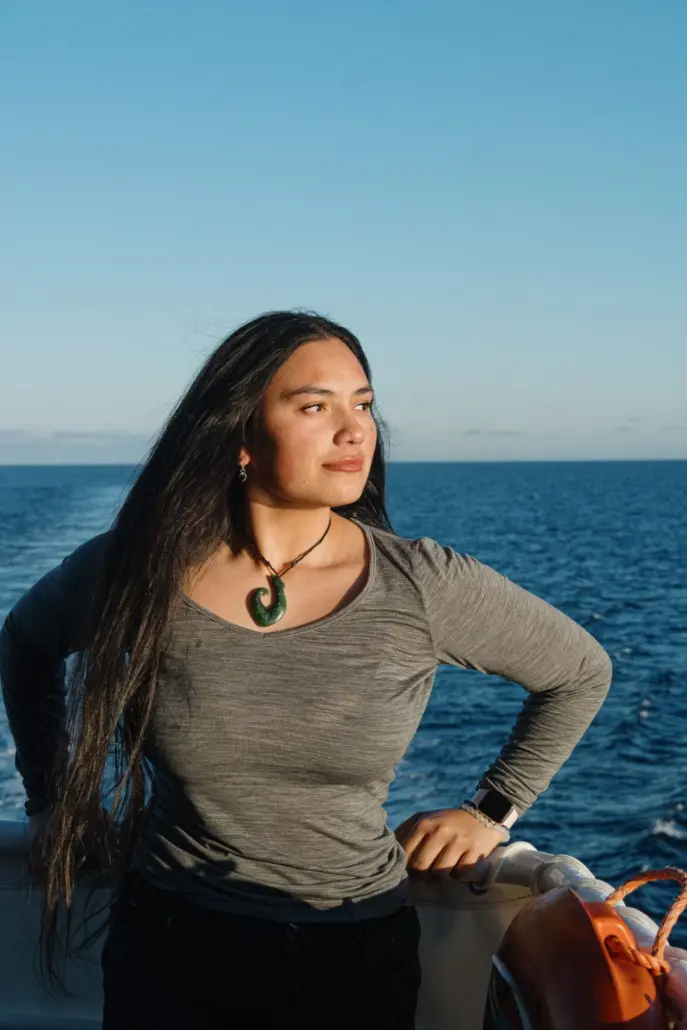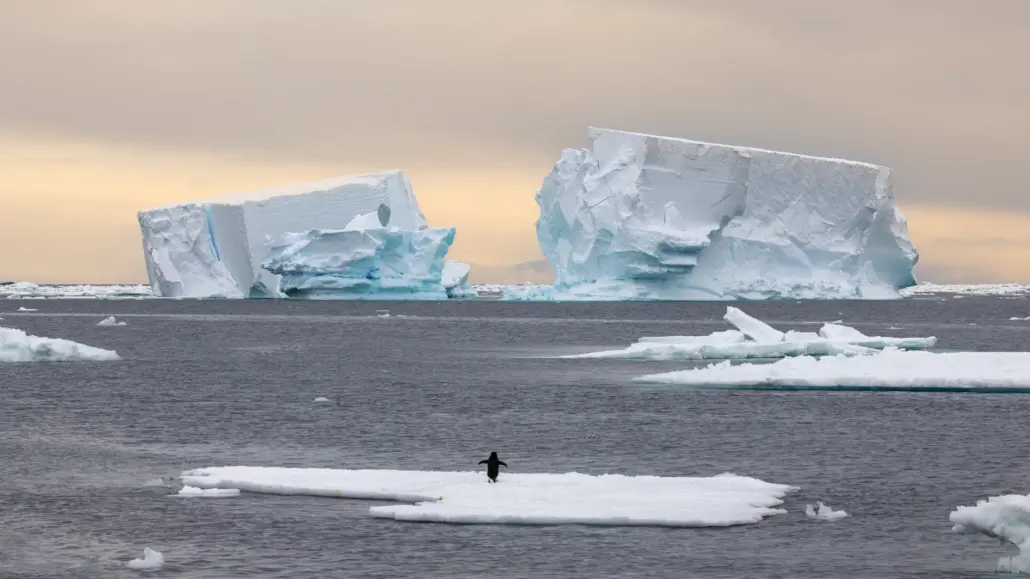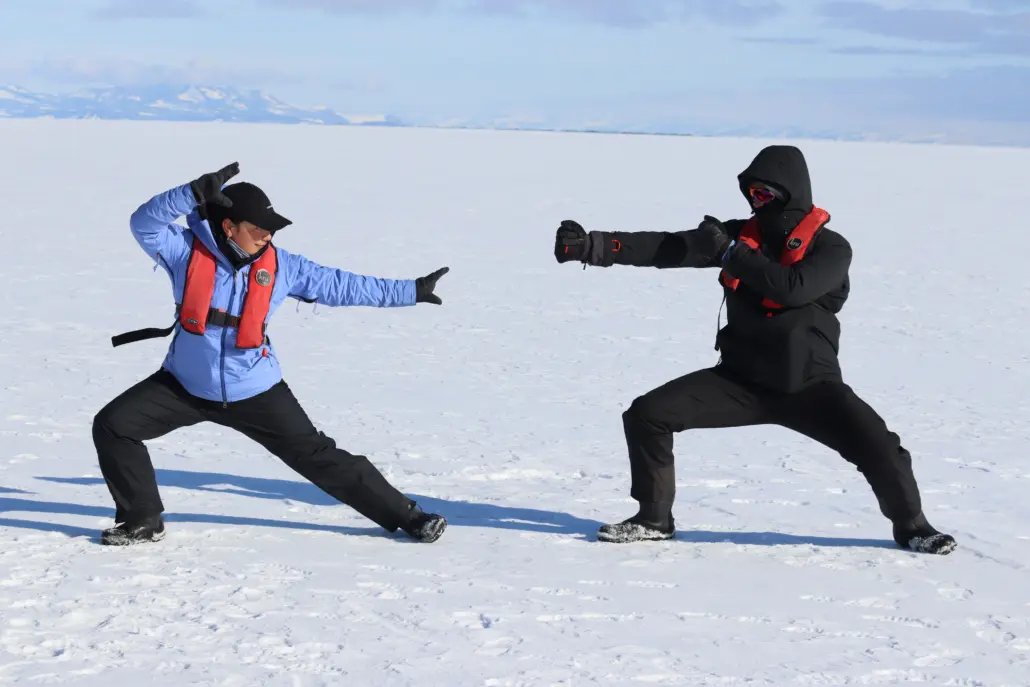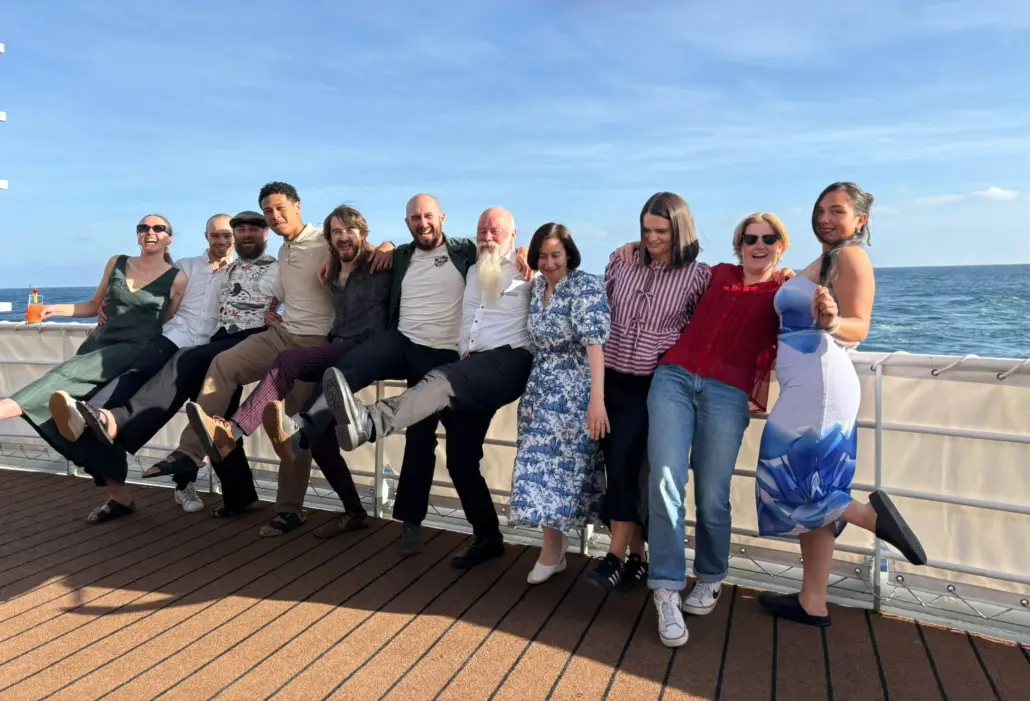Expedition Blog – Ngawai Clendon, Ross Sea 2025
Antarctica: The Cold Mirror of My Untravelled Soul
Kāhore taku toa i te toa takitahi, he toa takitini
We cannot succeed without the support of those around us
Kia Ora. Ko Ngawai toku ingoa. Ngawai Marino Te Rore Clendon. I’m 21 years old, and I’m from Rotorua, New Zealand. If you know anything about Rotorua, you know it’s a place that’s all about hot springs, geysers, and lush forests. But when it comes to travel, well, I wasn’t exactly a seasoned explorer. I hadn’t been anywhere much beyond Aotearoa until one day, out of the blue, I found myself standing on the frozen edge of the world: Antarctica.
My unexpected encounter with the Antarctic Heritage Trust happened one evening while I was working at a pub in Wellington. A customer out of nowhere suggested I apply for an upcoming expedition to Antarctica, briefly sharing details about the Trust’s South Georgia expedition in 2023, insisting I was exactly what they were looking for. At first, I brushed it off, convinced it was a far-fetched idea. But to avoid an awkward conversation, I reluctantly decided to apply. The next morning, I sat down, doubting I had any chance but feeling an odd sense of urgency. I submitted the application anyway, not expecting much, but curious about where it might lead.
Time moved at a rapid rate after submitting my application and all of a sudden, I was selected. The chosen one? VIP for an Antarctic adventure? Lucky that my name got pulled out of a hat? Who really knows? All I know is that it was the beginning of a new perception. Maybe it was the quiet voice in my head urging me to do something different, something that would shatter the comfort of my small-town life. Maybe it was the pull of something bigger than me, the vast, unexplored unknown. Whatever it was, I took the leap, and what I found there wasn’t just an icy, remote place on a map—it was a reflection of something far deeper.
The Ice: A Blank Slate of Self-Discovery
Before Antarctica, I had this idea that travel was about seeing new places, ticking boxes on a list. But when I arrived in Antarctica, I realised something important: travel isn’t just about seeing new landscapes. It’s about confronting yourself, your limitations, and your innermost thoughts.
Rotorua has its warmth, comforting smells of sulphur, and nature’s embrace. Antarctica? It’s cold. It’s stark. The first thing that hit me was the silence. It wasn’t just a quiet kind of quiet—it was an overwhelming absence of sound. The kind of silence that makes you realise how much noise we’re surrounded by in our everyday lives. The honk of car horns, the hum of traffic, the chatter of people passing by, the rattle of machinery—all of that was gone. Instead, there was only the howling wind, a sound that was less noise and more a reminder of nature’s power. I had expected to be amazed by the landscapes, and I definitely was, but I wasn’t prepared for the overwhelming stillness. It was like walking into a blank page—everything I’d known about noise, about life, felt distant, like a dream fading.
This was my blank slate. A place where there was no rush, no distractions. A place where I was forced to sit with myself in a way I hadn’t before. You can’t help but think when you’re standing on endless ice with no one but a handful of people around you. The isolation was real—there was nowhere to hide. But somehow, in that vast emptiness, I began to understand that isolation doesn’t always have to be lonely. It can be a place where you find out what’s left when everything else is stripped away.
The Huts: A Spiral of Thoughts
Visiting the four historic huts—Borchgrevink’s Hut at Cape Adare, Shackleton’s Hut at Cape Royds, Scott’s Hut at Cape Evans, and Scott’s Hut at Hut Point – were moments which pulled me out of the present and into a different reality. Walking into these timeworn shelters felt almost like crossing into another era, the cold air inside heavy with memories. It was impossible not to imagine what it must have been like for the explorers who sought refuge in these small, battered spaces. How did they continue on in the face of such crushing isolation? How did they push forward when the cold seemed like a living thing, wrapping itself around you, determined to make you stop? These huts, simple and unadorned, became lifelines—proof that humans are capable of adapting, even in the harshest of circumstances
Standing there, I couldn’t help but spiral into thoughts of what it means to survive. The cold, the silence, the endless stretch of all white seemed to echo the fragility of existence. These explorers weren’t just battling the elements; they were fighting against something deeper—against the mind’s instinct to break down, against the spirit’s desire to surrender.
How do you keep moving forward when everything around you tells you to stop? The huts stood as a testament to the unyielding drive to endure, even when survival seemed impossible. It made me question what it really means to be alive, to keep going when every part of you wants to give up. And yet, so many didn’t make it out of this place alive – survival isn’t just about physical endurance; sometimes it’s about holding on to something beyond the body, something intangible. The real weight of this place is not just in its cold, but in the reminder that human resilience has its limits—and even courage can falter when the environment is more powerful than any will.
The Symphony of Survival: Antarctica’s Wildlife in Harmony
Antarctica is like a silent orchestra, and the wildlife which calls it home are the musicians, each playing their part in a delicate, unspoken symphony. The penguins, dressed in their black and white tuxedos, are the conductors, gracefully moving across the icy stage in perfect synchronicity, setting the tempo for the rhythm of life.
The seals, powerful and fluid, are the drummers, creating deep, resonant beats as they slide effortlessly through the water, their bodies carving through the Southern Ocean like a percussion section keeping the tempo. Above them, the albatross flies – its wings slicing through the freezing air like a lone violinist, playing a melody of grace and precision, stretching across miles of wind and snow.
Each animal is part of a complex, harmonious ecosystem, where every note matters. The soundless music of this frozen world is not one of chaos, but of perseverance. Despite the brutal cold and isolation, the wildlife is thriving, showing resilience in ways we might not expect. These creatures are not merely surviving – they are performing, adapting to the unforgiving environment with remarkable skill.
The penguins, seals, and birds each play their roles in a beautiful dance of survival, proving that even in the most extreme conditions, life finds a way to sing. Antarctica’s wildlife reminds us that, in nature, every note, every movement, is essential to the harmony of existence. And it was I, who had the pleasure of being among such harmony.
Conclusion
In the end, I’ve only revealed a small slither of what it was like to experience Antarctica. The icy expanse, the wildlife, the history, and the raw beauty of it all are indescribable in words alone. It was a privilege to witness this pristine land, to step into the footprints of history, and to connect with a place so few will ever truly understand.
I owe this life-changing experience to the incredible work of the Antarctic Heritage Trust and the generous donors whose support made this trip possible. My heartfelt thanks go to all those who made this journey a reality (my family and friends), from the tireless efforts of the Trust to the people I met along the way. Without all of you, this would have remained a distant dream.
To my fellow group of Inspiring Explorers™, and the adopted guides and passengers who shared this adventure with me, you really bumped this trip from what would have been a 10/10, to a huge 11/10 (you all know who you are). There’s a classic whakataukī (Māori proverb) which goes, He aha te mea nui o te ao? He tangata, he tangata, he tangata. What is the most important thing in the world? The people, the people, the people”.
I never really grasped the full concept of that whakataukī until now, when I’ve come to realise these people have made such positive impacts on my life. They have given me drive, granted me with knowledge, and flourished me with acceptance and love. What an amazing group of people to be surrounded by.
Anna [Trust Communications and Engagement Manager] and Mike [Trust Inspiring Explorers™ Programme Manager], you both are super extraordinary, in your own unique ways. It has been my utmost pleasure to walk alongside both of you in Antarctica. In my interview for this expedition, you both asked who or what inspires me. It was a difficult question to answer because I couldn’t think of a single name which felt like a genuine and truthful answer. But the truth is, I’ve found exactly who inspires me, and that would be the both of you.
Thank you for making this journey a reality and for helping me uncover a world of discovery, resilience, exploration and wonder. Antarctica will forever remain with me, not only as a place on the map, but as a part of my own story.
I couldn’t have done this without the support of those around me.
My Antarctic friends,
In the cold, they stood closely.
Love that time won’t fade.
Ngā mihi,
Ngawai Clendon












